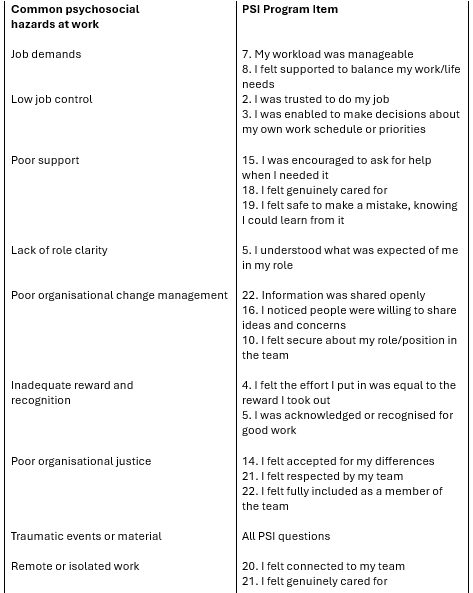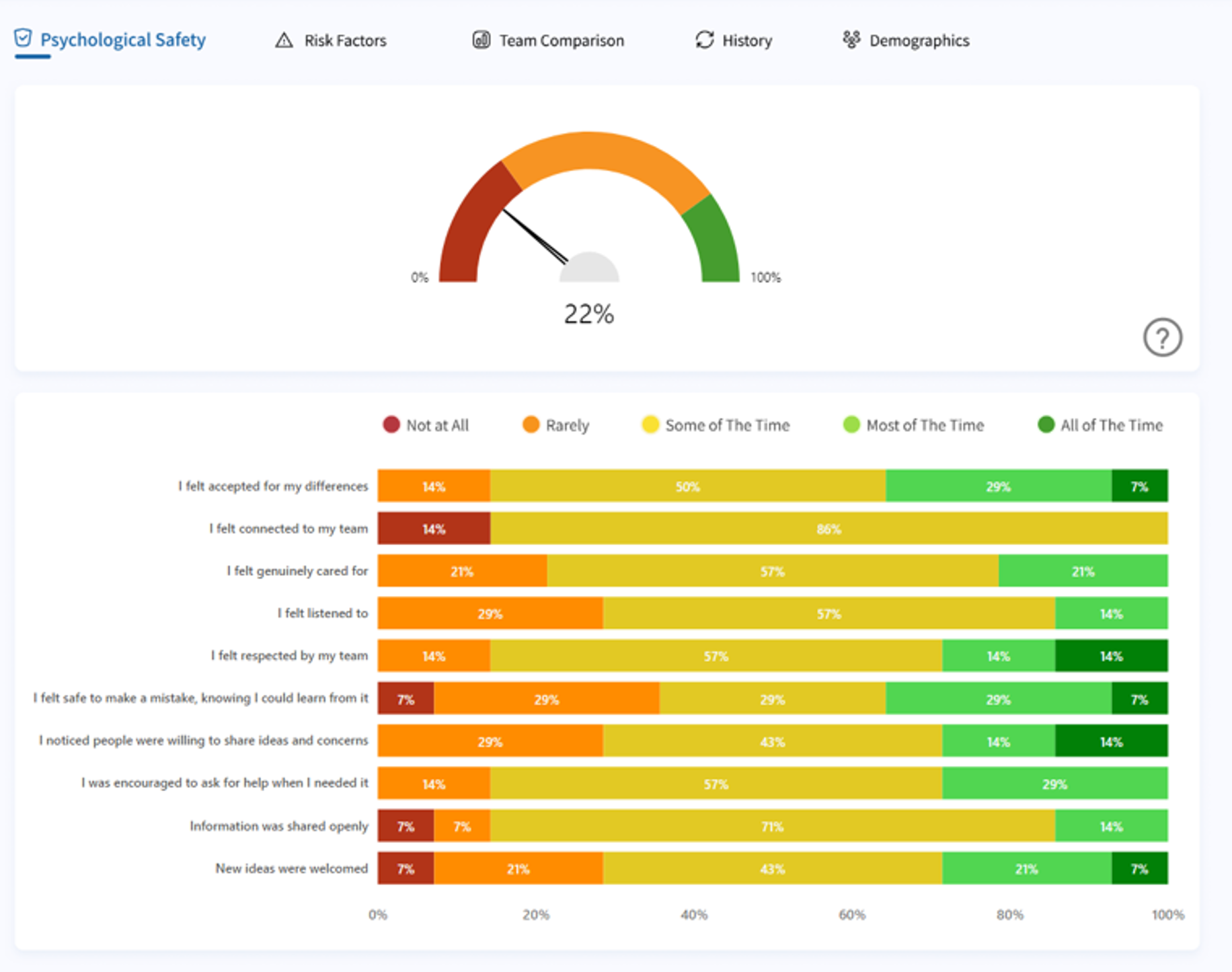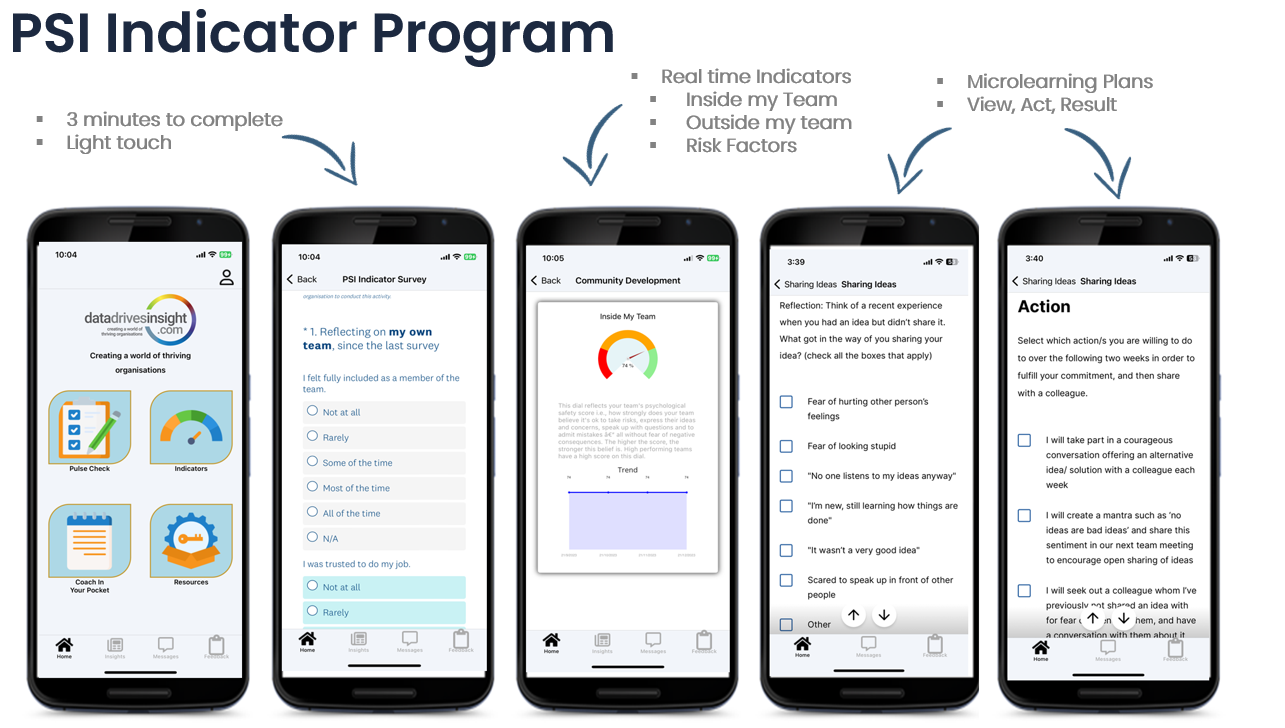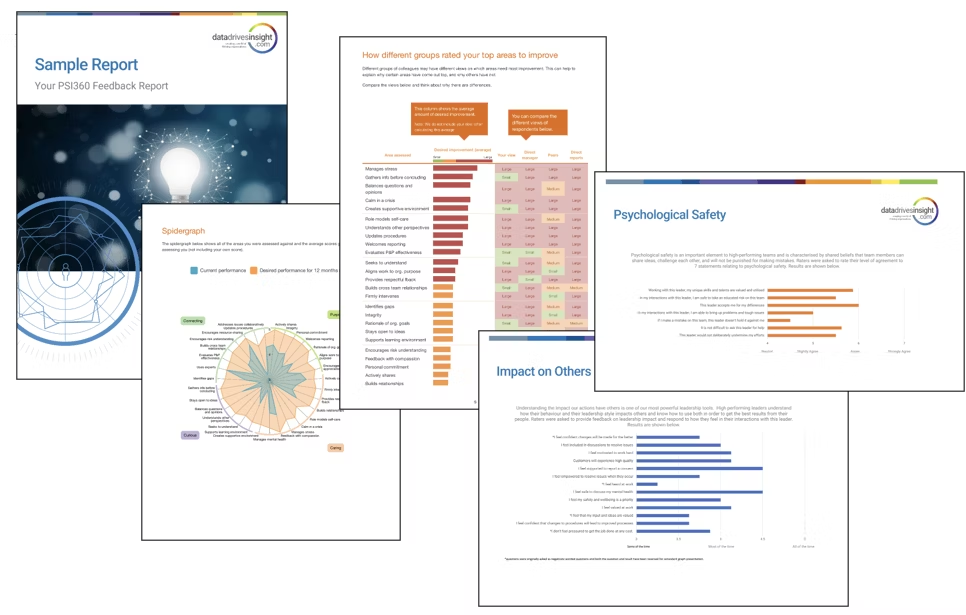PSI Indicator Program
Elevating Team Performance with Psychological Safety & Inclusivity
Psychological Safety
Under the new Work Health and Safety (WHS) laws approved as a Code of Practice, organisations are now responsible for eliminating or minimising psychological risks in the workplace. There are legal implications if these guidelines are not met, as well as costs to the business such as regrettable turnover and workers compensation claims, not to mention the invaluable 'people' costs when these risks are not managed. It is often the leader's responsibility to identify, manage and /or eliminate psychosocial risks. Beyond legislations, there is a direct correlation between psychological safety, predicted worker engagement and productivity – which means psychological safety can make or break team performance.
Teams with high psychological safety experience:
- A deeply engaged, productive and passionate workforce.
- Staff who take initiative and collaborate effectively.
- Effective decision making and higher quality solutions.
- Innovation, creativity and focus on excellence.
- Attract and retain better talent.
ISO 45003 is a global standard that provides practical steps and methods of best practice for managing psychological health within the workplace. Workplace injuries and mental health pose significant costs to the Australian economy.
According to Safe Work Australia, workplace injuries cost the Australian economy approximately $60 million annually, while the annual bill for poor mental health at work is estimated at $200-220 billion. These figures highlight the substantial financial burden associated with workplace hazards and the importance of addressing both physical and psychosocial risks.
ISO 45003 promotes a comprehensive approach to workplace safety and well-being.
The publication of ISO 45003 in 2021 emphasises the need for organisations to adopt an empirical approach to workplace safety and well-being, encompassing both physical and psychosocial risks. This standard provides guidelines for managing psychosocial hazards and promoting employee well-being, thereby enhancing overall workplace safety.
Compliance with ISO 45003 offers numerous benefits.
Voluntary compliance with ISO 45003 offers several advantages to organisations, including:
- Demonstrating fulfilment of duty of care to employees.
- Persuading regulators, such as HSE, of an organisation's commitment to employee safety and well-being.
- Enabling more sophisticated data gathering and analysis to measure performance in workplace safety management.
- Enhancing moral leadership and business performance.
- Addressing both physical and psychosocial risks is crucial for organisational success.
Organisations that fail to adequately address psychosocial risks in the workplace risk incur significant financial losses and decline in productivity. Embracing ISO 45003's principles and recommendations is a critical step towards fostering a safe, healthy, and productive work environment.
Psychosocial risk and psychosocial hazards are important; however the PSI Program extends BEYOND measuring just these things. It includes psychological safety, which contributes to performance, innovation etc., not just risk management.


Here's the kicker ... a ‘normal team’ has low psychological safety and instead prefers "artificial harmony."
In fact, we know that moving a team's rating of psychological safety from 3/10 to even a 6/10 can lead to;
•27% reduction in turnover
•40% reduction in safety incidents
•12% increase in productivity.
(Gallup Survey 2017)
Start the process of incorporating the PSI Program into your organisation today!
So how do we grow psychological safety?
First, we need to MEASURE it
PSI Program
The PSI Program leverages a market-leading diagnostic tool that measures an individual’s sense of psychological safety and inclusivity within their team, easily, anonymously and confidentially.
This allows leaders to understand and benchmark the psychological safety and risk profile of their organisation at any moment in time.
The PSI program is proven to create inclusive cultures by utilising neuropsychology to foster a climate where people are comfortable expressing and being themselves. In doing so, leaders can improve inter-department relationships, enhance performance, attract talent and retain staff.
There are 3 key components to a PSI Program Cycle
- 1.Pulse Check: to regularly get feedback
- 2.Interactive Dashboards: to present to the organisation to identify opportunities and focus areas in the feedback.
- 3.Member Portal with Microlearning Modules: for employees, to monitor the team result and participate in microlearning based on neuropsychology principles to improve psych safety at the front line.
Expand each of the following sections to find out more about each component of the cycle.
The intent of the pulse check is to measure the factors that lead to the level of psychological safety that the employee has at that point in time. How often the pulse check is conducted is flexible, meaning that the process is agile and dynamic whilst also being connected to enablement, creating a direct benefit for the employee, leading to greater engagement.
Each pulse check takes 3 minutes to complete and is accessible via the DDI App or email.
The pulse check asks a series of questions relating to the key Psychological Safety Indicators from the perspective of “within my team” and “outside my team”. This is an important distinction because there is often a discrepancy identified, which can impact Psychological Safety.

Interactive dashboards provide a simple way to access the insights that are automatically generated from each pulse check.
With a simple traffic light system, leaders can analyse the strengths and weaknesses of their team as it relates to the factors impacting psychological safety, thus showing the areas needing attention at that point in time.

Dashboards are also generated for hierarchies, enabling summarised views and the analysis of teams in comparative way, clearly identifying which teams within the hierarchy of the dashboard need the most attention.
Hierarchies can be established at different levels, such as whole organisation, business unit, geography, team discipline.
Microlearning modules are designed with the basic principle of “nothing changes if things don’t change”. The basis of this is that results are an outcome of actions and to change a result, we need to change the action that led to the result. People act based on their view at the time, so to expect a different action to be taken, we need to change our view.
Click on this link to experience a micro-learning yourself: Managing Workloads
Each module offers a guided experience to help the employee internalise the results as well as what led to the result, then analyse and understand the implications, which creates the opportunity to consider and embrace a new view. The module then solidifies the enablement by creating a commitment to change, resulting in an environment of shared accountability.
The example below shows a microlearning being accessed via the DDI Mobile App.

"I have noticed an improvement in the way in which we collaborate, innovate, and learn from each other with this enhanced team trust and cohesion.
I feel that this has helped lead to better communication, decision-making and overall team effectiveness.”
CEO testimony | PSI Program Participant, 2023.
Lift leaders' ability to create safe and inclusive teams
Local level leadership has a 70%+ impact on a team’s level of psychological safety. So, what does it take to be a leader effective at creating psychologically safe and inclusive teams?
An effective leader will be constantly on the lookout for how to make the environment more safe and more inclusive and committed to inspiring others to do the same. They’ll be curious as to how that has come about and why others may not have noticed it. Because of their commitment, it will be intolerable for them not to take action to make the environment safer; immediately and more sustainably into the future. Because they genuinely care about others, even people they don’t know, they’ll find a way to ensure that the learning is shared with others throughout the business (and even beyond).
The PSI 360 Leadership Assessment provides leaders with feedback from their manager, peers and direct reports, on how they currently perform against these competencies. They also provide feedback on where they would like the participating leaders to be in 12 months – providing clarity on the areas that can be focused on to lift leadership impact. Impact is also measured, with raters indicating how engages and psychologically safe they feel in their interactions with the leader.
The PSI 360 experience includes the following key elements:
- Comprehensive personal report with feedback from line manager, peers and direct reports to provide insights into strengths, and potential blind spots and growth areas.
- Confidential debrief with an accredited coach to review and reflect on results and develop a personalised action plan.
- Access to self-development resources to support learning and growth.
Aggregated feedback from a group of leaders (min N=5) can be used to guide ongoing leadership development activities across the organisation, in line with the PSI Program.

Lift leaders' ability to create safe and inclusive teams
Local level leadership has a 70%+ impact on a team’s level of psychological safety. So, what does it take to be a leader effective at creating psychologically safe and inclusive teams?
An effective leader will be constantly on the lookout for how to make the environment more safe and more inclusive and committed to inspiring others to do the same. They’ll be curious as to how that has come about and why others may not have noticed it. Because of their commitment, it will be intolerable for them not to take action to make the environment safer; immediately and more sustainably into the future. Because they genuinely care about others, even people they don’t know, they’ll find a way to ensure that the learning is shared with others throughout the business (and even beyond).
The PSI 360 Leadership Assessment provides leaders with feedback from their manager, peers and direct reports, on how they currently perform against these competencies. They also provide feedback on where they would like the participating leaders to be in 12 months – providing clarity on the areas that can be focused on to lift leadership impact. Impact is also measured, with raters indicating how engages and psychologically safe they feel in their interactions with the leader.
The PSI 360 experience includes the following key elements:
- Comprehensive personal report with feedback from line manager, peers and direct reports to provide insights into strengths, and potential blind spots and growth areas.
- Confidential debrief with an accredited coach to review and reflect on results and develop a personalised action plan.
- Access to self-development resources to support learning and growth.
Aggregated feedback from a group of leaders (min N=5) can be used to guide ongoing leadership development activities across the organisation, in line with the PSI Program.

About Us | DataDrivesInsight.com
Your trusted source for 360-degree leadership feedback, staff engagement, culture and capability assessments. DataDrivesInsight.com seek to empower all industries with the insights needed to overcome challenges and thrive, one organisation at a time.
DDI’s solutions provide comprehensive insights that allow decision makers to act from a place of informed awareness. They highlight the gaps, blind spots, and limiting beliefs that hinder performance, and illuminate the strengths, opportunities and levers for change that facilitate great leadership, culture and safety performance.
The DDI team work with a broad range of organisations and governments across Australia and have continued to evolve their market-leading diagnostics and reports to enhance performance and outcomes.
